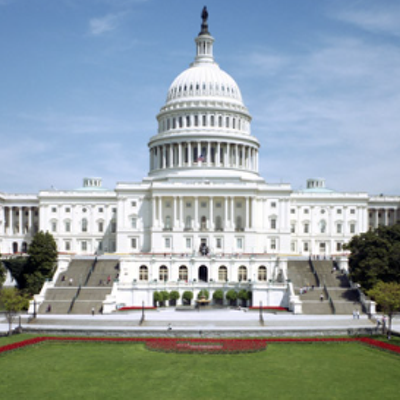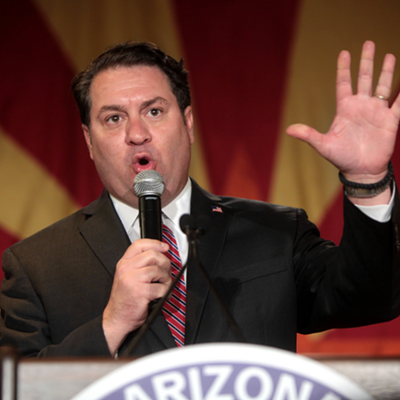DISCLOSURE EXPOSURE
Shaun McClusky, who launched his new avocation as a political activist after answering a robocall from the Pima County Republican Party seeking candidates for the Tucson City Council last year, is in hot water with the city of Tucson.
McClusky got a letter last week from City Attorney Mike Rankin saying that he’d broken campaign-finance laws during his recent stint as chairman of a political committee opposed to the city of Tucson’s proposed half-cent sales tax, which was rejected by 61 percent of the voters.
McClusky’s violation—a failure to disclose who was paying for a televised political advertisement—has resulted in a fine of $18,450.
”They can come after me all they want,” says McClusky, who has recently been threatening to launch recall campaigns against City Council members who support any layoffs of police officers or firefighters. “I still don’t think I did anything wrong.”
At issue is a TV ad that McClusky’s committee, No on Prop 400, ran in the weeks before the election, urging voters to reject the sales tax prop, which would have raised an estimated $40 million a year.
The ad didn’t include the disclosure of major donors, which is required by state law.
McClusky claims that he wasn’t required to disclose the donors, because a clause in the state law says that disclosure isn’t required until after Nov. 2, 2010.
But in the letter to McClusky, Rankin and Assistant City Attorney Dennis P. McLaughlin note that while an amendment to the law added to the disclosure requirement after this year’s election, “The amendment did not eliminate the previous requirement to disclose funding sources.”
Old political pros are well aware of disclosure requirements, but rookies sometimes run afoul of technical aspects of campaign-finance law. McClusky conceded that he’s new at the political game.
”I’m an everyday kind of guy,” McClusky says. “I’m not a political expert.”
McClusky, who works in the real-estate and property-management business, says his company’s attorney passed up the opportunity to represent him for free, so now he’s looking to meet with a lawyer recommended by state Sen. Frank Antenori.
McClusky is also skeptical about the city’s determination that he owes more than $18,000. He says the ad only cost $150 to produce, so he should only owe three times that, or $450.
But city lawyers—backed up by considerable precedent—say that the law actually calls for a fine of three times the cost to produce and run the ad, which is why McClusky is looking at the five-figure fine.
POLITICAL MALPRACTICE
Tom Jenney of the Arizona branch of Americans for Prosperity has a simple solution to solve the state’s budget crisis: Stop funding public health-care programs.
”The Medicaid opt-out would singlehandedly balance Arizona’s state budget, make room for large pro-growth tax cuts, and strike a blow against the ObamaCare health care takeover,” Jenney declared in an e-mail last week.
He added that dropping all Medicaid coverage was “good politics. If Arizona stays in Medicaid, the Legislature and governor will face weekly accusations of cruelty. Every inevitable cut to AHCCCS will become a newspaper headline and fodder for left-wing messages about the 91-member death panel at 1700 West Washington.”
Perhaps our understanding of the media is fundamentally flawed, but we don’t believe that Arizona’s decision to stop funding all health care for the poor will put an end to bad publicity for the Arizona Legislature. We imagine, instead, that there would be many more stories about poor people with no health insurance, and hospitals going out of business because they can’t afford to remain open, because they’ve been treating people who can’t pay for their care.
The left-wing media would also be likely to cover the skyrocketing premiums that would result from the loss of government funding for coverage that insurance companies now count on (although we suppose that Jenney and his allies would blame those increases on ObamaCare).
SUPREME REVIEW
We mentioned a few weeks back that Clean Elections, the program that provides public funds for politicians for statewide office, had a lingering legal problem revolving around matching funds.
This week, the U.S. Supreme Court agreed to review the case regarding matching funds—which provide additional money to Clean Elections candidates whose privately funded opponents raise more money—early next year.
The decision to hear the case has supporters of Clean Elections worried that matching funds will be struck down by the court, therefore making Clean Elections a pretty bad option for candidates. Supporters are now talking about creating some kind of hybrid system that would allow candidates to raise private funds while still receiving some public funds.
Expect to see details emerge once the legislative session is underway. No one has benefitted from Clean Elections more than Arizona’s social conservatives, who would have never risen to ascendance without political welfare, because the business community would have funded moderate GOP candidates who could have squashed the conservatives in primaries.
So we won’t be surprised to see those same Republicans who want to cut funding for everything in government make an exception for their own political campaigns.
A BETTER TAX DEAL?
State Sen. Frank Antenori, a Republican who represents Tucson’s eastside, tells The Skinny that he’s pulling back on plans to push for a flat income tax in Arizona—at least for now.
”That’s turning out to be more complicated than I thought it would be,” Antenori says. “I got everybody coming out, screaming and hollering about ‘can’t do it’ because of this, ‘can’t do it’ because of that.”
Arizona’s income tax tends to be a pretty good deal for most residents, since the wealthiest Arizonans pay the bulk of it. Flattening the tax would mean a big cut for Arizona’s richest citizens and a hike for most everyone else, but Antenori says a flat rate would be the most fair.
”I still think it’s doable,” Antenori says. “I think it’s going to be a long, arduous process to get it through, and it’s probably going to get the living crap amended out of it to get it passed, but I’d still like to get something in there. It may be a hybrid that then we can tweak as the years go by to refine it and improve it, but we’ve got to start getting it in there. It’s just not gonna be the degree of purity that I wanted to see in a flat tax.”
Antenori says he supports another tax-reform plan being floated by GOP leaders to reduce the property taxes on businesses, even though that will lead to higher property taxes on homeowners if counties, school districts and other jurisdictions that depend on property taxes collect the same amount in taxes. That’s because shifting the burden away from businesses means that homeowners would have to absorb a higher percentage of the overall tax that’s collected.
Antenori says because there are so many homeowners, the individual increases will be minor.
”So yes, while you will see an increase in residential property taxes that will offset some of the cuts on the business property-tax side, it’s going to be relatively small. The return on the economic side by getting more people back to work, I think, is a better benefit.”
Follow the Skinny scribe on Twitter: @nintzel








